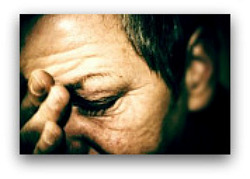Sinus Headache Symptoms
Sinus Headache Symptoms - Overview
Sinus headache symptoms can be misleading.
The reason? A number of symptoms overlap those of a migraine headache.
It has been estimated that in the United States, fewer than 50% of migraines get accurately diagnosed.
In fact, they are often misdiagnosed as sinus pressure headaches and to a lesser extent, tension headaches.
 To reinforce this point, a recent study showed that chronic sinusitis patients that suffer repetitive attacks, don’t necessarily get frequent sinus headaches.
To reinforce this point, a recent study showed that chronic sinusitis patients that suffer repetitive attacks, don’t necessarily get frequent sinus headaches.
To further add to the problem, Madison Avenue has done a wonderful job of diverting attention away from migraines and focusing their audience’s attention on sinus. As a result, the U.S. is the only country in the world that regards sinus headaches as a significant health problem.
This overexposure tends to exacerbate the misdiagnosis phenomenon.
Sinus Headache or Migraine?
The most noticeable consequence of sinus infection is the pain of a pressure headache.
As mentioned above, sinus headache symptoms often mimic those of a migraine, and migraine headaches are more common than most people think.
Without specialized training, it's impossible for you to diagnose your symptoms accurately.
If you make a mistake and assume you have a sinus headache when you actually have a migraine, there are two possible scenarios:
- You consult your doctor.
- You decide to treat yourself without seeking medical advice.
Let’s consider the first possibility:
If you make an incorrect assumption and tell your doctor that you’re experiencing sinus problems. This could be misleading.
Most doctors are constantly pressed for time, so s/he may focus his or her attention on the sinus issue without considering the possibility of a migraine.
A misdiagnosis could result.
Before jumping the gun and winding up with the wrong medication, you should simply report the debilitating headache without mentioning sinus. That way, the doctor will do his or her job by ruling out other possible underlying causes.
If you do have a sinus headache, your doctor will soon identify the sinus infection and then cross reference to known sinus headache symptoms. On the other hand, if there are no supporting sinus symptoms, the chances of a misdiagnosis are virtually zero.
Now for the second possibility:
You think you have a sinus headache, but you actually have a full-blown migraine.
You decide to skip the doctor’s visit and consult your pharmacist instead.
He points you toward the over the counter (OTC) painkillers, antihistamines and decongestants.
You load up your shopping basket, pay for the medication and head on home.
A couple of hours after dosing yourself, you feel like climbing the wall because your headache has gone ballistic.
Why?
Taking sinus medication for a migraine is a grave mistake, most of them simply intensify the migraine - and that's just the start. By now, the headache is so bad that you'd probably decide to punish yourself by taking more sinus medication.
Bottom line?
Never make assumptions when it comes to your health. Always consult a qualified medical practitioner instead of trying to self-diagnose sinus headache symptoms.
Sinus Headache Symptoms
One or more of the following could indicate a sinus headache:
- Constant deep pain and a feeling of pressure focused on the cheeks, brow or forehead.
- Face is tender to the touch.
- Facial swelling or swelling around the eyes.
- Blurred vision.
- Pain intensifies if you move your head suddenly, bend forward or lie down.
- Post nasal drip and nasal discharge.
- Increased pain and thick plugs of yellow-green or blood tinged mucus when you blow your nose.
- Congestion.
- Sore throat.
- Fever.
- General feeling of malaise.
- Fatigue.
- Hacking cough.
- Headache starts with a bad cold or immediately afterwards.
Migraine Headache Symptoms
- Pain intensifies with sudden head movement or when bending forward.
- Thin watery nasal discharge.
- Nasal congestion.
- Sensitivity to facial pressure.
- Headache often throbbing and one-sided.
- Nausea and vomiting.
- Visual disturbances known as "Auras".
- Highly sensitive to loud noise or bright light.
---Sidebar---
There's an excellent e-book available, entitled Migraine Relief. This book offers a safe, fast natural migraine relief system that works for most people.
---Sidebar---
The differences between the two?
Although Migraine pain intensifies when bending forward and is often accompanied by nasal discharge, sinus headaches do not promote nausea, sensitivity to bright light, sensitivity to loud noise and visual auras.
Also, whereas a throbbing pain characterizes a migraine headache, most sinus headaches cause a constant deep-seated pressurized pain.
This pain can also ease up somewhat immediately after discharging a large plug of mucus.
Finally, a migraine normally lasts for a few hours to a day or two, whereas a sinus headache could last a week or more.
----Sidebar----
Many sufferers engage in a relentless
Internet hunt for effective remedies, and
this is where interactive websites and
forums, such as our own Pay It Forward
section, play an important part.
----Sidebar----
Need Help? e-mail us at: remedybusters@gmail.com or click here.
Was This Article Helpful?
If so, a small donation (even $1) would help underwrite the cost of maintaining this website, and allow us to provide even more free home remedy content.
To make a donation, use the button below and fill in an amount. Thanks!
PayPal - The safer, easier way to donate!
~~~~~~~~~~~~~~~~~~~~~~~~~~~~~~~~References
- University of Maryland Medical Center - Sinus Headache
- Web MD - Migraines & Headaches Health Center
- American Academy of Otolaryngology Fact Sheet: Sinus Headaches
- Mayo Clinic - Sinus headaches
Back to Home Remedy Site home page, from Sinus Headache Symptoms



